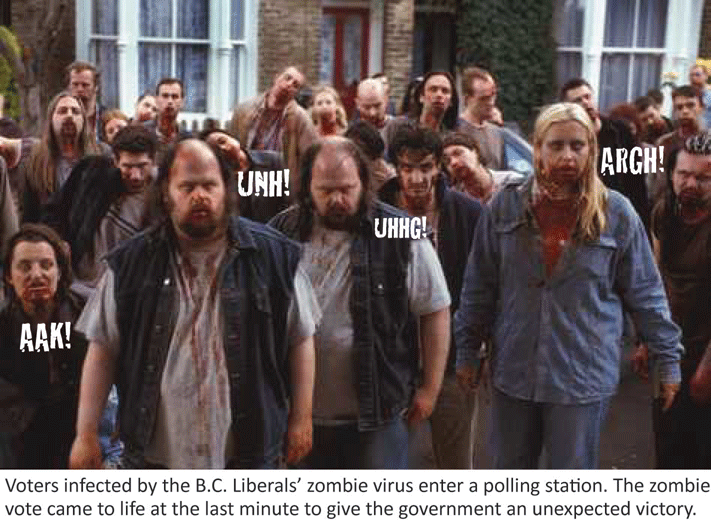 |
 |
 BRIAN COHEN: “Good evening. With a commanding lead in the polls and anti-government sentiment widespread, nobody gave the government of premier-designate Christy Clark much chance of re-election. Yet, by Election Day the opposition New Democratic Party’s 16-point lead in the polls had vanished.
BRIAN COHEN: “Good evening. With a commanding lead in the polls and anti-government sentiment widespread, nobody gave the government of premier-designate Christy Clark much chance of re-election. Yet, by Election Day the opposition New Democratic Party’s 16-point lead in the polls had vanished.
“How did the British Columbia government, which did little more than generate public outrage and epitomize ineptitude, pull off the seemingly impossible? To shed light on this bizarre reversal of misfortune we are joined in the studio by WTFN’s political correspondent Eric Blair. (Camera pulls back into a two-shot and Cohen looks to his left). Eric, what happened?”
 ERIC BLAIR: (looks rather anxious)“Well, Brian, this was no ordinary election.…”
ERIC BLAIR: (looks rather anxious)“Well, Brian, this was no ordinary election.…”
COHEN: “…You can say that again!”
BLAIR: “No, seriously! It wasn’t ordinary. Something very… disturbing took place!”
COHEN: “What are you talking about?”
BLAIR: (struggles to find the right words) “Look…an election is supposed to be the time for voters to use their best judgment to select their leaders, right? Well, that didn’t happen.”
|
ADVERTISEMENT
|
||
 |
 |
|
|
Order from Amazon.com,
as well as Amazon.co.uk, Amazon.de, Amazon.fr, Amazon.it Amazon.es and Kindle! |
||
BLAIR: “Zombie apocalypse, Brian! The government spread a mutated zombie virus through the media to turn otherwise intelligent voters into pro-government drones.”
COHEN: (Looks at Eric Blair with utter incredulity.)
BLAIR: “I know what you’re thinking, but it’s true! It’s happened before! During the last Canadian federal election, zombies streamed to the polls to re-elect a government that had openly violated Canadian law, been found in contempt of Parliament, and secretly colluded with a foreign government, Israel, behind Parliament’s back. Remember how Canadian voters gave Harper a majority because they said they were tired of voting in general elections? That was the result of the zombie virus. The B.C. Liberals used a mutated form to intellectually anaesthetize B.C. voters.”
COHEN: “I hate to admit it, but that does sort of make sense. For starters, the B.C Liberals quintupled the provincial debt, imposed a sales tax without obtaining legislative authority, and coerced residents into having “smart” metres installed on their homes, despite legitimate claims of health and privacy concerns. It’s hard to see how the party stood any chance.”
BLAIR: “Yes, especially when you remember that Clark’s predecessor, Gordon Campbell, was overwhelmingly loathed—just a 6% approval rating. She inherited a sclerotic, corporatist party and was even having to put down an internal party revolt.”
COHEN: “So, Eric, tell us how the virus works.”
BLAIR: “Essentially, it’s designed to attack the brain’s cognitive and short-term memory centres and overstimulate the areas responsible for fear and prejudice. The Liberals knew it couldn’t run a campaign on their accomplishments—they didn’t have any—so they had to make voters fear the opposition.
“In the last weeks of the election, especially during the final week, we saw ad after ad smearing the NDP and its leader Adrian Dix. Standard slogans were ‘Weak Leadership /Weak Economy’ and ‘They did it before; they’ll do it again’—meaning ‘screw up the economy’ with public spending and taxes. The TV ads were the most effective, and after the election, TV talking heads were orgasmic with glee at the result. Instant experts even praised Clark for having a ‘vision’, rather than blind luck.”
 |
COHEN: “But the virus didn’t affect everyone. The NDP still won many seats, and Clark was defeated in her own riding.”
BLAIR: “True, but that’s only because some voters had been inoculated with education, and had not forgotten the government’s record of ineptitude. They were immune to fabricated anti-socialist scare tactics.”
COHEN: “Why weren’t more people ‘inoculated’?”
BLAIR: “Much of the blame for that goes to Dix, ironically. The NDP was so sure of victory that the party thought it could be both politically victorious and morally virtuous, so they did not counter with its own negative ads. By undervaluing the virus’s virulence the party left voters vulnerable. In the end, the government’s abysmal record ceased to be a factor, and the election turned on anti-socialist fearmongering.
“One of the most ludicrous examples was the smear against NDP candidate Frank Huang because was once a member of the Chinese Communist Party. As anyone who has ever studied communist states knows, party membership is often necessary just to get a decent job. It does not connote ideological support for communism. Yet that didn’t stop a scurrilous government attack on him for being a security risk, as if that were even remotely credible.
COHEN: “Admittedly, the NDP are politically to the left but that doesn't make them socialist, and certainly not communist. In fact, there is no socialist party anywhere in Canada. Not even the federal NDP could be considered socialist in any European sense. So how did a propaganda campaign based on a rhetorical nonsense succeed?”
BLAIR: “Easily, really. The virus also exacerbated a pre-existing mutated CIT1 gene in the body politic. The mutation first appeared in the U.K. with the 1979 election of Margaret Thatcher, followed by the 1980 election of Ronald Reagan in the U.S. and, of course, the 1984 election in Canada of Brian Mulroney.
“Once established this mutated gene spread its undemocratic encoding throughout all aspects of society, changing the attitudinal orientation of voters. The socially conscious person who cared about the greater good (citizen) regressed into the atavistic ‘economic man’ who cares only about his pocketbook (taxpayer). Government spending, which used to be seen as respectable, even necessary for a civilized society, became anathematized, and social spending of any kind became associated with socialism and anti-individualism.”
COHEN: “I can see how this mentality could spread in the U.S., given its culture of radical individualism and unenlightened self-interest, but governments were chiefly responsible for building Canada. We have always had a mixed economy, and social services like universal health care and Crown Corporations like the CBC are some of our proudest achievements.”
BLAIR: “Well, there appear to be two causes. The first is that the mutated CIT1 gene had a cascading effect. It passed on its faulty political encoding to ‘tumorsupressor genes’ via the media. In times past, intelligent people could be counted on to oppose malignant policies, but the CIT1 mutation switched off the defensive genes that govern voting behaviour, civic pride and compassion. Many anti-government voters are now apathetic, resigned and cynical toward politics in general. The absence of a strong anti-government turnout allowed the zombie virus to overwhelm B.C.’s ‘anti-cancer defences’. Only now does Dix acknowledge his failure to take anti-viral measures.”
COHEN: “What’s the second?”
BLAIR: “The second is the rising proportion of wealthy Asian immigrants to Greater Vancouver, especially from China. Exceptions like Frank Huang notwithstanding, they tend to vote overwhelmingly for pro-business parties and buy into the myth that social spending is harmful. It is here that we most clearly see the ascendancy of the taxpayer mentality.”
COHEN: “Given this disturbing scenario, do you think the province is doomed to one-party government?”
BLAIR: “Unless people become educated, take voting seriously, and demand honesty from their media, I fear politics in B.C. is over. So long as the zombie virus is allowed to spread unchecked, and the educated among us die off, insufficient numbers of citizens will realize that government is a corporate façade and a threat to the well-being of the province and the country. I think we need to remember what the late U.S. philosopher Sidney Hook said 60 years ago:
‘Exaggerated claims of economic ineptitude and fearmongering stereotypes of socialist or even communist state control are harmful because they divert attention from real threats to our freedoms. They emanate from the cultural vigilantism of certain pressure groups in economics, education, immigration and politics.’”
COHEN: “That’s brilliant. (turns to camera) Well, that about does it for another show. Stay tuned to WTFN for our feature film presentation Zombieland, which seems only fitting. Good night.”
|
|